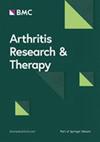Clonal T cell populations scarcely impair patients with rheumatic diseases: a prospective long-term follow up study
IF 4.6
2区 医学
Q1 Medicine
引用次数: 0
Abstract
Clonal T cell populations are frequently detected in patients with rheumatic diseases. The relevance of this finding is often uncertain, as the clinical spectrum can range from being asymptomatic to T cell leukemia. Former studies suggested that certain anti-rheumatic drugs might influence the course of the clonal T cell populations. A prospective long-term follow up study was performed including patients with rheumatic diseases and clonal T cell populations. Clinical features, adverse events, especially infections and cytopenias, and immunosuppressive medication were assessed. T cell populations were characterized by polymerase chain reaction, flow cytometry and stimulated cell cultures. 28 Patients with rheumatoid arthritis, spondyloarthritis, or giant cell arteritis were prospectively followed for up to 7.6 years. Severe infections or cytopenias (10.7% autoimmune neutropenias) were rare. The clonal T cell populations mostly persisted over time, the tumor burden decreased in the long-term. The cytokine secretion in stimulated T cell cultures did not differ in the subgroup of RA patients with versus without clonal T cells. Clonal T cell populations in patients with rheumatic diseases are common, but are rarely harmful. Feared neutropenia, infections or progression into T cell leukemia could not be detected in the long-term in our cohort.克隆T细胞群几乎不损害风湿病患者:一项前瞻性长期随访研究
在风湿病患者中经常检测到克隆T细胞群。这一发现的相关性通常是不确定的,因为临床谱可以从无症状到T细胞白血病。以前的研究表明,某些抗风湿病药物可能影响克隆T细胞群的病程。一项前瞻性长期随访研究包括风湿病患者和克隆T细胞群。临床特征,不良事件,特别是感染和细胞减少,免疫抑制药物进行了评估。通过聚合酶链反应、流式细胞术和刺激细胞培养对T细胞群进行了表征。28例类风湿关节炎、脊椎关节炎或巨细胞动脉炎患者的前瞻性随访长达7.6年。严重感染或细胞减少(自身免疫性中性粒细胞减少10.7%)是罕见的。克隆T细胞群大多随时间持续存在,肿瘤负荷在长期内下降。在有克隆T细胞和没有克隆T细胞的RA患者亚组中,刺激T细胞培养中细胞因子的分泌没有差异。克隆T细胞群在风湿病患者中很常见,但很少有害。在我们的队列中,长期无法检测到中性粒细胞减少症、感染或进展为T细胞白血病。
本文章由计算机程序翻译,如有差异,请以英文原文为准。
求助全文
约1分钟内获得全文
求助全文
来源期刊

Arthritis Research & Therapy
RHEUMATOLOGY-
CiteScore
8.60
自引率
2.00%
发文量
261
审稿时长
14 weeks
期刊介绍:
Established in 1999, Arthritis Research and Therapy is an international, open access, peer-reviewed journal, publishing original articles in the area of musculoskeletal research and therapy as well as, reviews, commentaries and reports. A major focus of the journal is on the immunologic processes leading to inflammation, damage and repair as they relate to autoimmune rheumatic and musculoskeletal conditions, and which inform the translation of this knowledge into advances in clinical care. Original basic, translational and clinical research is considered for publication along with results of early and late phase therapeutic trials, especially as they pertain to the underpinning science that informs clinical observations in interventional studies.
 求助内容:
求助内容: 应助结果提醒方式:
应助结果提醒方式:


